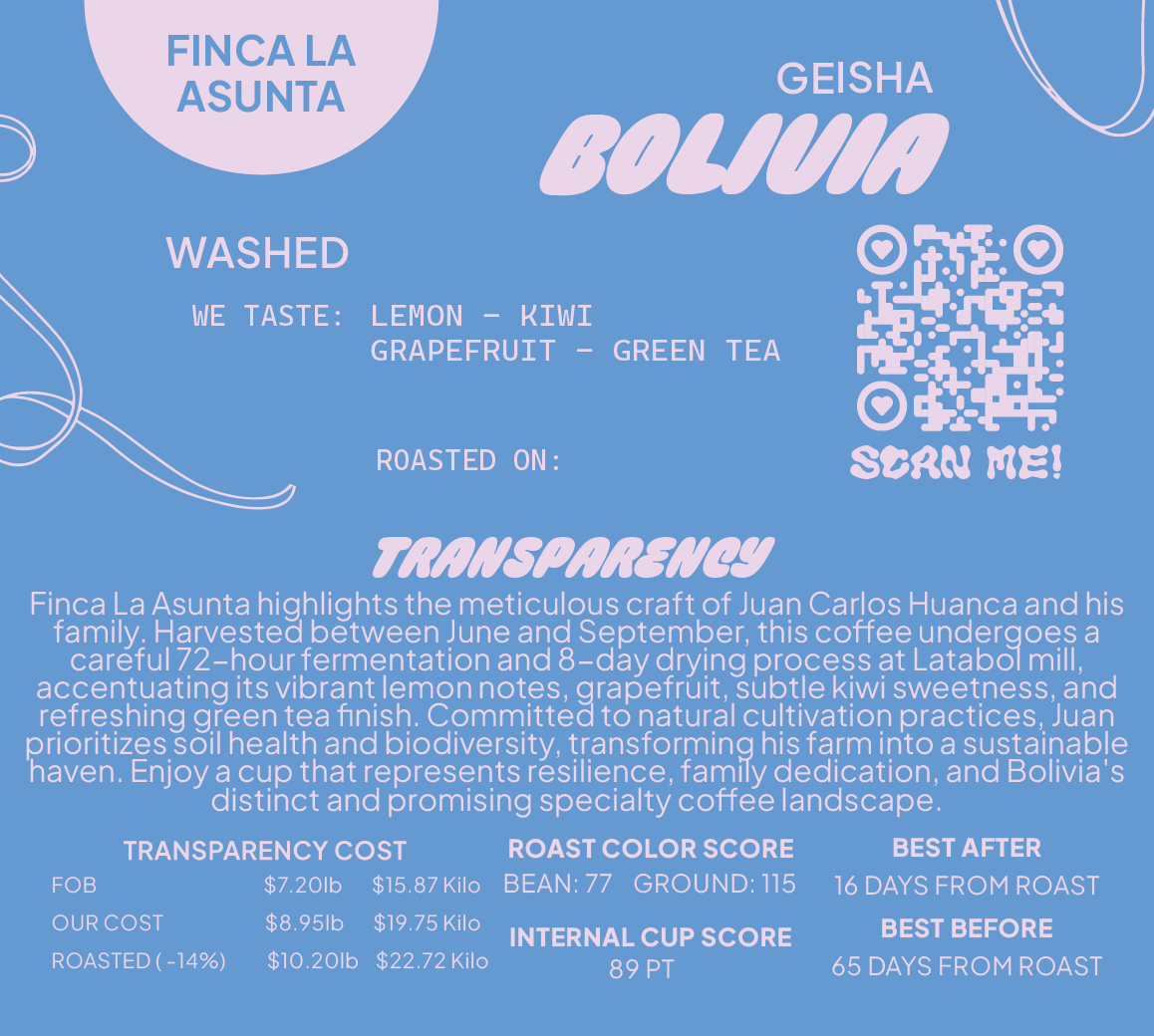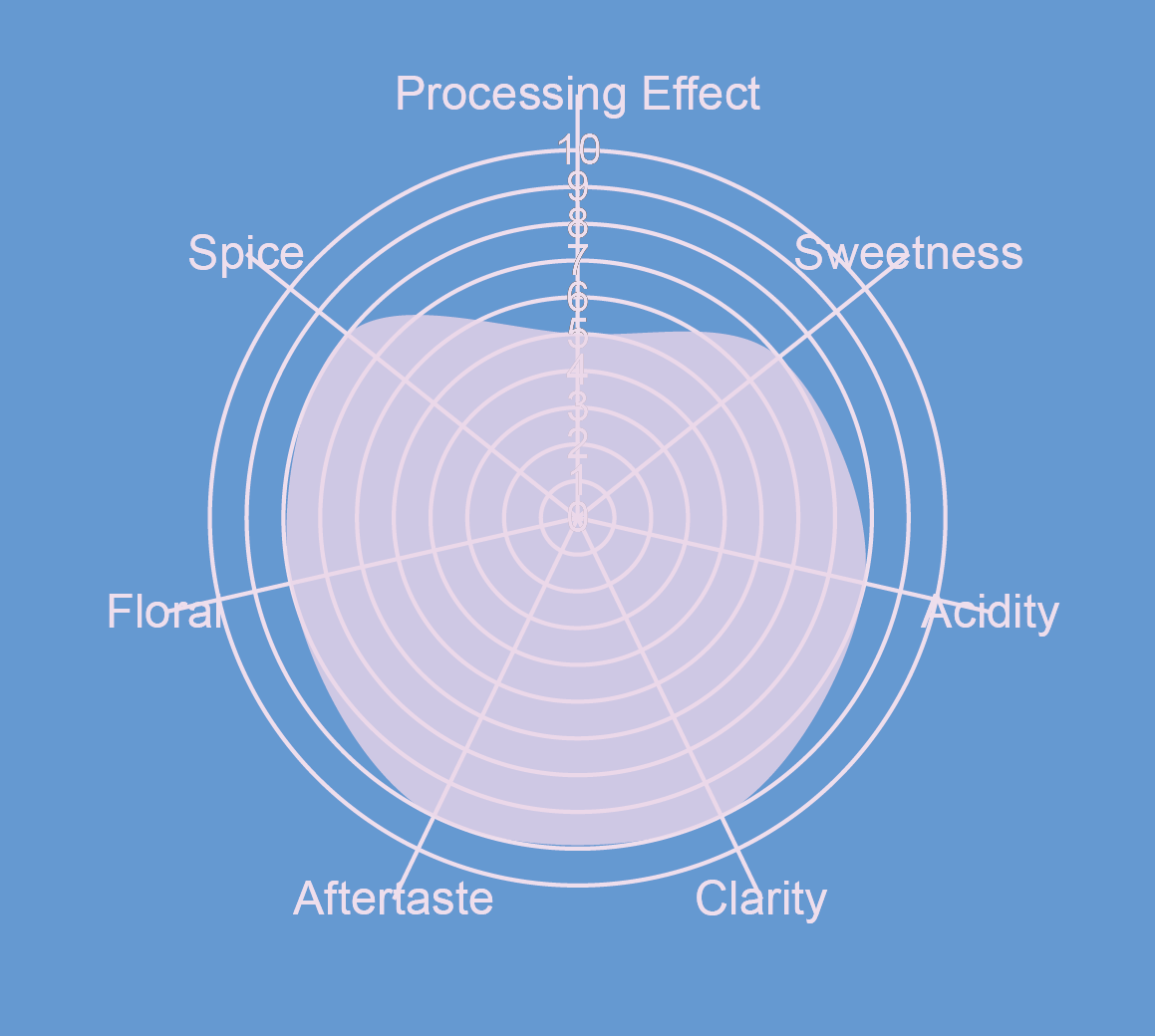


















Bolivia Geisha Washed
Grown in the fertile hills of La Asunta, Bolivia, this washed Gesha from Finca La Asunta highlights the meticulous craft of Juan Carlos Huanca and his family. Harvested between June and September, this coffee undergoes a careful 72-hour fermentation and 8-day drying process at Latabol mill, accentuating its vibrant lemon notes, grapefruit, subtle kiwi sweetness, and refreshing green tea finish. Committed to natural cultivation practices, Juan prioritizes soil health and biodiversity, transforming his farm into a sustainable haven. Enjoy a cup that represents resilience, family dedication, and Bolivia's distinct and promising specialty coffee landscape. We are lucky to work with Juan the last 3 years.
What's included in each experience
TAKEOUT BOX - ALL THE EXTRAS
The Takeout Box comes with:
- A 200-gram bag of coffee
- One fortune cookie or Hi-Chew
- A few stickers
- One packet of instant coffee
- One custom brewing water packet from Third Wave Water
- A detailed coffee card
JUST A BAG
This option contains:
- One 200-gram bag of coffee
- One instant coffee packet
- One detailed coffee card
1 KILO BAG
This option contains:
- One 1000-gram bag of coffee
- Two instant coffee packets
- One custom brewing water packet from Third Wave Water
- One detailed coffee card
2 KILO BAG
This option contains:
- One 2000-gram bag of coffee
- Two instant coffee packets
- One custom brewing water packet from Third Wave Water
- One detailed coffee card
Coffee Info
Location: Finca La Asunta - La Paz
Country: Bolivia
Producer: Juan Carlos Huanca
Mill: Latabol
Process: Washed
Varietal: Geisha
Harvest date: 2024
Volume Purchased:170
About the farm: The washed was fermented for 72 hours and dried between 7-9 days.
Drying time: 8 Days
Drying Temperature: NA
Humidity: 10.5%
Density: .7
Water Activity: NA
Stabilization: 22 Days
Elevation: 1541 masl
Temperature: 15-32’C
Total trees: 4000
Other trees: yuca, plantain, limes, guama, guava, coffee walnut, another local native trees.
Taste Cup Profile
Lemon, Grapefruit, Kiwi, Green Tea
Processing Cup Effect : 5
Sweetness : 7
Acidity : 8
Clarity : 9
Aftertaste : 9
Floral : 8
Spice : 8
Internal Cup Score : 89
Bean: 77 Ground:115
Transparency cost
Here, we share what the producer or farm manager is comfortable with sharing, like export, milling, and pickers' pay, as it helps to know who you support. We always share at minimum Farmgate, FOB, and our cost.
NA
FOB : $7.20LB / $15.87KILO
NA
Our Cost Of Green : $8.95LB / $19.75KILO
Roasted cost 14% : $10.20LB / $22.72KILO
Packaging : $1.98
Luminous Labor : $28 HOUR
Ship Dates
We pack all orders and then ship them out at 9 AM on Monday through USPS. For international orders, we use DHL, which ships at 11 AM on Monday.
Tracking information is sent to your email. For any issues, please reach out to us.
We also roast some batches on Saturday on Instagram Live, so you can tune in, ask questions, and learn about the process.
Brew Recipe Tool
Producer Q & A
How did you come into working in coffee?
I was born in the Camacho province and I arrived in the Yungas in 1992 with my father, who was a coffee farmer. In 2004 I was able to buy my own land and planted a Creole variety but the disease ruined everything. After that, I had to start over and I planted catuai and took care of them a lot. Since then I have been in specialty coffees and I can take care of my three children with this.
What makes this harvest or lot different from others?
It is a very delicate variety, dedicate more time to it so that it is not affected by any pest or lacks nutrients. I know it's a very good coffee because we work hard as a family to make it high quality.
What would you say separates your coffee from others?
Most of the coffee in Bolivia comes from Caranavi in the Nor Yungas region. We are in La Asunta, Sud Yungas, which is of a different origin within the same country. This region is characterized by producing the Coca leaf, although in recent years this production overflowed, almost irreversibly affecting the fertility of the region. By planting coffee as an alternative product, we reduce coca production and recover biodiversity since coffee needs shade. In addition, unlike coca, we seek to have natural fertilizers so that our soils are fertile for many more years.
What does your day consist of managing the farm or farms?
I wake up very early, almost always at 5 am to start work. Depending on the season we have different duties, whether it is removing weeds, pruning, fertilizing, and harvesting. We always work as a family and even though we went through difficult times, coffee always helped us keep going.
What opportunities are you looking for from people who buy your coffee or work with you currently?
We are a single origin. Bolivia does not produce a large quantity (at the moment) but we do have quality and all of us in the business are eager to be proud of our products. We work with ancestral methods and always hand in hand with mother earth to have a better future for our children.
Where does your sense of passion for coffee come from?
Coffee made us grow as a family. It not only sustains us to get us through the day, but it signifies the quality of life. This item allowed me to grow in my house, increase my plantation and even my children study. I hope to continue in this specialty coffee business for much longer, having more and more coffee.
Are you looking to grow relationships with long-term partners?
Yes, we have been working for many years with the same people and more and more producers are joining the project.
Feel free to share anything on your mind about the industry or yourself. We sell not just to consumers but to the industry, which often looks at what we buy and tries to buy it too, benefiting everyone.
To all those who are drinking this coffee, I hope you enjoy it a lot. After a fall, the most important thing is to get up and continue with more strength, learning from the mistakes that are made. I lost almost all of the first plantation I had because it got sick and I didn't know how to control the pests. I felt devastated since I had spent a lot of money and also had my small children. Despite the difficulties we went through and thanks to the support, not only physical but also moral, that my wife gave me, we managed as a family and tried again to plant coffee. Now we are taking the risk of producing exotic varieties and we are doing much better than we were before. It is never too late for a new beginning.
